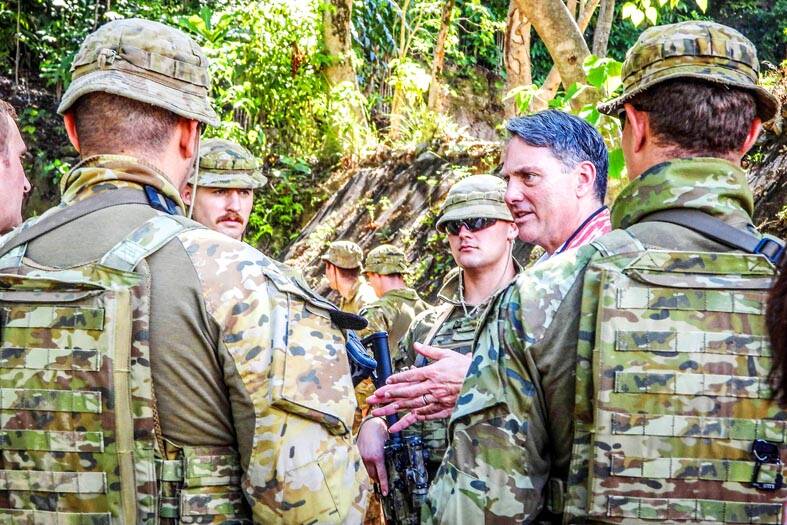Australia and New Zealand yesterday announced plans for the allies’ armies to work more closely together as New Zealand looks to its larger neighbor for help reinvigorating an armed forces battling worker shortages.
Plan ANZAC, named after the Australian and New Zealand Army Corps World War I force, aims to improve army interoperability with more cooperation in the areas of training, capability, readiness and personnel. Special forces troops were singled out as an area for continued cooperation.
The plan also aims to support participation in the American, British, Canadian, Australian and New Zealand Armies’ Program, a military standardization pact between the powers that also operate the Five Eyes intelligence-sharing alliance.

Photo: AFP
“As close neighbors and allies we have a mutual commitment to support each other’s security ... and maintain a shared focus on the security and stability of our wider region,” New Zealand Army Chief Major General John Boswell said in a statement.
New Zealand’s only formal defense ally Australia has signed up to the AUKUS technology sharing alliance and is spending hundreds of billions on new weapons, raising concerns about whether New Zealand’s military can keep pace and maintain interoperability.
The announcement comes at a time when geopolitical tensions are ramping up in the Pacific and the need to respond to climate change disasters becomes more frequent.
New Zealand has idled three of its nine navy vessels and retired its P-3 Orion air fleet early as workers leave the military for higher pay elsewhere.
“We will be able to better share lessons across capability development, doctrine for training, and many other areas related to the generation, and in the New Zealand Army’s current case, the regeneration of land combat capability,” Boswell said.
The deal builds on a 2018 agreement to work more closely together to maintain regional stability and improve the effectiveness of joint operations with cooperation on logistics, communication and training.

HISTORIC: After the arrest of Kim Keon-hee on financial and political funding charges, the country has for the first time a former president and former first lady behind bars South Korean prosecutors yesterday raided the headquarters of the former party of jailed former South Korean president Yoon Suk-yeol to gather evidence in an election meddling case against his wife, a day after she was arrested on corruption and other charges. Former first lady Kim Keon-hee was arrested late on Tuesday on a range of charges including stock manipulation and corruption, prosecutors said. Her arrest came hours after the Seoul Central District Court reviewed prosecutors’ request for an arrest warrant against the 52-year-old. The court granted the warrant, citing the risk of tampering with evidence, after prosecutors submitted an 848-page opinion laying out

STAGNATION: Once a bastion of leftist politics, the Aymara stronghold of El Alto is showing signs of shifting right ahead of the presidential election A giant cruise ship dominates the skyline in the city of El Alto in landlocked Bolivia, a symbol of the transformation of an indigenous bastion keenly fought over in tomorrow’s presidential election. The “Titanic,” as the tallest building in the city is known, serves as the latest in a collection of uber-flamboyant neo-Andean “cholets” — a mix of chalet and “chola” or Indigenous woman — built by Bolivia’s Aymara bourgeoisie over the past two decades. Victor Choque Flores, a self-made 46-year-old businessman, forked out millions of US dollars for his “ship in a sea of bricks,” as he calls his futuristic 12-story

FORUM: The Solomon Islands’ move to bar Taiwan, the US and others from the Pacific Islands Forum has sparked criticism that Beijing’s influence was behind the decision Tuvaluan Prime Minister Feletei Teo said his country might pull out of the region’s top political meeting next month, after host nation Solomon Islands moved to block all external partners — including China, the US and Taiwan — from attending. The Pacific Islands Forum (PIF) leaders’ meeting is to be held in Honiara in September. On Thursday last week, Solomon Islands Prime Minister Jeremiah Manele told parliament that no dialogue partners would be invited to the annual gathering. Countries outside the Pacific, known as “dialogue partners,” have attended the forum since 1989, to work with Pacific leaders and contribute to discussions around

END OF AN ERA: The vote brings the curtain down on 20 years of socialist rule, which began in 2005 when Evo Morales, an indigenous coca farmer, was elected president A center-right senator and a right-wing former president are to advance to a run-off for Bolivia’s presidency after the first round of elections on Sunday, marking the end of two decades of leftist rule, preliminary official results showed. Bolivian Senator Rodrigo Paz was the surprise front-runner, with 32.15 percent of the vote cast in an election dominated by a deep economic crisis, results published by the electoral commission showed. He was followed by former Bolivian president Jorge “Tuto” Quiroga in second with 26.87 percent, according to results based on 92 percent of votes cast. Millionaire businessman Samuel Doria Medina, who had been tipped